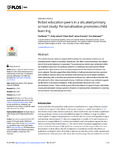Robot education peers in a situated primary school study: Personalisation promotes child learning
| dc.contributor.author | Baxter, P | en |
| dc.contributor.author | Ashurst, E | en |
| dc.contributor.author | Read, R | en |
| dc.contributor.author | Kennedy, J | en |
| dc.contributor.author | Belpaeme, T | en |
| dc.date.accessioned | 2017-07-11T14:27:47Z | |
| dc.date.available | 2017-07-11T14:27:47Z | |
| dc.date.issued | 2017-05-23 | en |
| dc.identifier.other | e0178126 | en |
| dc.identifier.uri | http://hdl.handle.net/10026.1/9608 | |
| dc.description.abstract |
The benefit of social robots to support child learning in an educational context over an extended period of time is evaluated. Specifically, the effect of personalisation and adaptation of robot social behaviour is assessed. Two autonomous robots were embedded within two matched classrooms of a primary school for a continuous two week period without experimenter supervision to act as learning companions for the children for familiar and novel subjects. Results suggest that while children in both personalised and non-personalised conditions learned, there was increased child learning of a novel subject exhibited when interacting with a robot that personalised its behaviours, with indications that this benefit extended to other class-based performance. Additional evidence was obtained suggesting that there is increased acceptance of the personalised robot peer over a non-personalised version. These results provide the first evidence in support of peer-robot behavioural personalisation having a positive influence on learning when embedded in a learning environment for an extended period of time. | en |
| dc.language.iso | en | en |
| dc.title | Robot education peers in a situated primary school study: Personalisation promotes child learning | en |
| dc.type | Journal Article | |
| plymouth.author-url | https://www.ncbi.nlm.nih.gov/pubmed/28542648 | en |
| plymouth.issue | 5 | en |
| plymouth.volume | 12 | en |
| plymouth.publication-status | Published online | en |
| plymouth.journal | PLoS One | en |
| dc.identifier.doi | 10.1371/journal.pone.0178126 | en |
| plymouth.organisational-group | /Plymouth | |
| plymouth.organisational-group | /Plymouth/Faculty of Science and Engineering | |
| plymouth.organisational-group | /Plymouth/Research Groups | |
| plymouth.organisational-group | /Plymouth/Research Groups/Marine Institute | |
| plymouth.organisational-group | /Plymouth/Users by role | |
| dcterms.dateAccepted | 2017-05-08 | en |
| dc.identifier.eissn | 1932-6203 | en |
| dc.rights.embargoperiod | Not known | en |
| rioxxterms.versionofrecord | 10.1371/journal.pone.0178126 | en |
| rioxxterms.licenseref.uri | http://www.rioxx.net/licenses/all-rights-reserved | en |
| rioxxterms.licenseref.startdate | 2017-05-23 | en |
| rioxxterms.type | Journal Article/Review | en |
| plymouth.oa-location | https://doi.org/10.1371/journal.pone.0178126 | en |


